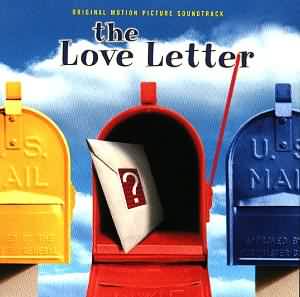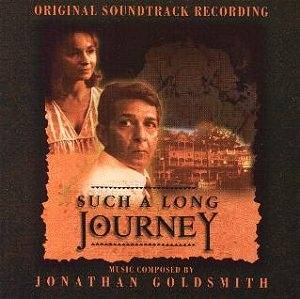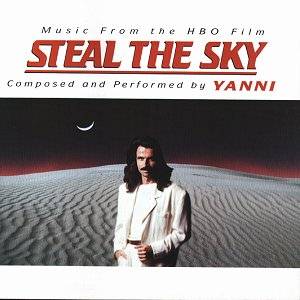
Film Music Editor: Ian Lace |
||
 |
September 1999 Film Music CD
Reviews |
|
![]() COMPETITION WIN
a CD of your Choice
COMPETITION WIN
a CD of your Choice
![]()
Return to Earlier September reviews
Return to the September (2) Index
************************************************************** EDITOR’S CHOICE – September (2) 1999
**************************************************************
Luis BACALOV The Love Letter OST
RCA Victor 09026 63521 2 [43:56]

This score is positively brilliant and enchanting.
Now, I usually ignore the directors' prattlings that appear on so many album booklets but in this case, Peter Ho-Sun Chan's words hit the nail on the head. He says -
"At first the impulse to use tango as the theme of the movie was a tough one to rationalise. How does one pair the exotic, Latin sound and the out-of-control passion of tango with the subdued serenity of an American, New England coastal town? But I've always believed that when it comes to love, there are no cultural boundaries. That's why we can make a movie scripted by a New Yorker, directed by a Chinese from Hong Kong and scored by an Italian composer who is originally from Argentina.
The Maestro, Luis Bacalov's music is so luxurious, almost sinful, almost intoxiacting, that upon hearing it, one can barely walk in a straight line. With music, he describes falling in love the way Byron described it with words…"
- some of Peter's remarks might be a bit fanciful but broadly speaking he is quite right.
Bacalov takes the tango as his starting point and weaves a tapestry of musical pictures that underline the event and emotions of the story. The opening cue 'You Graze My heart' begins tenderly and romantically with fragile material for mandolin and piano, before the music develops into a gentle tango that is both wistful and witty. It also has a subtle 'pop' seam. This cue and the following 'Mystery and Love letters' are thoroughly charming. Bacalov spins an aura of magic and mystery while creating a heart-warming, front-porch, small-town-America atmosphere. (He also subtly alludes to the popular Italian film music style of Cinema Paradiso.) Here I must interject and say that much of the success of the recording of this score must be attributed to the immaculate and expressive playing of the Orchestra di Roma and the featured players.
The mandolin and accordion lead in the lovely romantic 'The Postcard (I want to spend my life with you).' From this point, we are treated to a series of variations on the tango. The inevitable and admonitory 'beware' response to the dreams of 'The Postcard' comes with the cynical murmurings of the bassoon in 'You can't love a letter' with colour added from drums, fluttery flutes and cautioning violins. But then we have a 'wonder-of-falling-in-love' Tango in 'The Love Letter (First Time)' with witty asides from flute and bassoon while love's innocence is eloquently expressed by the piano. 'Even an orange can be dangerous' is intrigue and cartoon capers - a sort of Tom and Jerry Tango. This cue is very imaginative and very amusing with some extraordinary orchestration. 'The Picnic' is romantic Tango with violin and mandolin leading. Contorted violin figures certainly give the impression of 'Going crazy' and 'Tango Letter' is jazz/swing orientated Tango. That Italian film music influence pervades the slow dreamily romantic 'Fly, love letter, fly.'
Two pieces of source music are featured: Chet Baker performing 'I've never been in love before,' and Louis Armstrong, 'I'm in the mood for love.'
The album is rounded off with a neat (in all senses of the word) solo piano performance by the composer of the Love Letter theme.
For the unashamed romantic this is absolutely fabulous - totally delicious
Reviewer
Ian Lace

Elmer BERNSTEIN The Deep End of the Ocean Music from the film conducted by the composer
MILAN 35873-2 [30:09]

I can do no better than begin my review of this album by quoting the composer's notes in the CD's booklet:-
"Deep End of the Ocean is a film about a family being held in a very delicate balance after the abduction of their youngest son. This causes a dysfunctional relationship between husband and wife and mother and the remaining two children.
"Because the central character in this film is an absent child, much of the music and its instrumentation suggests child-like memories. There is a great presence of harps, bells and musical sounds which conjure up images of childhood. Although there is a general and, in my opinion, regrettable trend toward synthesised music, such sounds would be inappropriate in a film which is about people and people's anguish. Therefore, the orchestration leans on musical sounds we associate with people rather than machines. Because of the fact that there is a delicate balance in the relationships, the score is subtle and unobtrusive in an effort to support rather than disturb that balance."
I found that I was writing practically all those words on my notepad as I was listening to the music, and before I read Elmer Bernstein's notes (honest!) which only goes to show how well his music communicates. This music is fragile, vulnerable, nostalgic as well as being lively and exuberant - all the feelings we associate with childhood. In a way Bernstein is revisiting his To Kill A Mocking Bird score. It is closely related in many ways. There is the same darkness and sense of hidden threat and isolation - the music is sometimes disturbing, abrupt and antagonistic. Sometimes it seems isolated and remote. But there is much more which sets it apart as a considerable score in its own right. It is, above all, melodic and captivating. I would mention one track 'Home Again' in which a guitar is prominent in its opening pages. You are immediately struck by the music's close resemblance to Rodrigo's Concierto de Aranjuez. This particular cue has a haunting quality and the music passes through some varied and interesting colorings suggesting a wide variety of moods and situations.
This is Elmer Bernstein in deeply personal mode. He delivers a memorable score
Reviewer
Ian Lace

Jonathan GOLDSMITH Such A Long Journey Unforscene Music 6 2428 40008 2 4 [40:18]

If Goldsmith (no known relation !) concocted this score with no prior experience with Indian instrumentation or styles, the guy's a genius. Even if he did - this is still something pretty special, and light years away from anything else you'll have listened to in film music in many years.
The credited instruments are: esraj, sitar, tamboura, surmundal, cello, bansuri flutes, clarinet, and tabla. What this makes for is a night in with an up-market Indian restaurant ensemble. Although phrases re-appear to suggest linking motifs, you're hard pressed to identify what might be specific themes. Which is a most refreshing change in a 40 minute stretch.
Goldsmith plays keyboards as orchestral sample overlays, so there are the occasional traditional Western moments ("The Ledger"). Most of all, you'll be left with having had a very distinct new flavour.
Reviewer
Paul Tonks

Carter BURWELL The General's Daughter MILAN 73138 35885-2 [50:22]

Like the director, let's take this as a score in two parts. One concern is to not be area specific. It's largely set in the American deep South, and he really wished to skip the good ol' slide guitar cliché. It's a stretch, but his alternate take goes for its own sub-category division. He got field worker songs from the '30s and '40s sampled and mixed with contemporary rhythms. For the result made into a song opening and closing album and film - "She Began To Lie" - it's a weird feeling of Portishead style vocals and dance music.
The sourced music continues in this "Gothic South" style through a couple more mixes. Then there's a very poor choice of using both "Amazing Grace" and "O Fortuna." Will they never stop killing these poor pieces with over-use?
Part two of the director's pre-determined bid for uniqueness was to get Burwell to fuse 2 of his recent sounds. That of Fargo and Conspiracy Theory. No prises then for working out what the resultant score sounds just like ! There is a nice poignant theme introduced in "Exercise In Darkness" - just as requested. There is plenty of jazzy upbeatness to the drama ("The Conspiracy") - also as requested.
Maybe sometimes getting what you asked for doesn't get you what you necessarily wanted...
Reviewer
Paul Tonks

George FENTON A Destiny of Her Own OST
RESTLESS 74321 658692 [67:12]

A Destiny of Her Own tells the story of Veronica Franco, a celebrated poet who was also a prostitute in 16th Century Venice. With a background of warfare and pestilence the film covers a lot of contradictory ground and therefore the producers required Fenton to deliver a score that would hold a precarious balance between these many disparate elements. George Fenton, was therefore an ideal choice - for he is a practised and magical musical juggler. Remember his opening titles music for White Palace? The Mozart piano concerto type music for the stiff James Spader character segueing into and balancing the jazz treatment of the same theme to suggest the more street-wise and older waitress, Susan Sarandon?
Fenton writes a score which is only partially 16th century in spirit. There are pastiches of courtly dances but the music is for a modern orchestra (with a lute/mandolin added occasionally for period colour). The style is late Romantic with a seasoning of neo-classical. There is tender, dreamily romantic and poignant music for Veronica's love interest. In contrast, there is darker music of intrigue, war and tragedy. Two of the most impressive cues are 'First Poetry Duel' and 'Second Poetry Duel'
'First Poetry Duel' begins hesitantly and insecurely but gradually the music gains a swagger that indicates the poet's growing confidence and ultimate triumph. 'Second Poetry Duel' has lots of Italian colour and exuberance - and buffoonery - until the music suddenly clouds over, cloaked with intrigue and suggestive of something far more dangerous.
I wish I could be really enthusiastic about this score. I am sure it does its job very well but it is all a bit bland. I have to say that I was reminded of a recent comment by someone on one of the film music web site discussion groups. He bewailed that the magic that was the film music of the Golden Age of Hollywood is no longer. I thought of this comment when I listened to the cue 'The Plague' and remembered David Raksin's score for Forever Amber and his brilliant and chilling evocation of the Plague of (17th Century) London. Fenton's music here is good but it does not reach Raksin's inspiration. A nice entertaining score
Reviewer
Ian Lace

Craig ARMSTRONG Best Laid Plans OST
VIRGIN CDVUS157 7243 8 47912 2 3 [56:12]

Skipping past the unfortunate collection of songs (performed by Neneh Cherry, Mazzy Star, Patsy Cline, Massive Attack, Eagle Eye Cherry, and Gomez; are 'songtracks' a social requirement now?) leaves approximately 19 minutes of a score with interesting moments, though not much else.
Craig Armstrong's score is emotionally effective, but rather like a scattershot hybrid of Christopher Young's "Judicial Consent" (which itself essentially improved upon John Williams' "Presumed Innocent") and an exceedingly unassertive pop mentality. Particularly dull is the cue 'Father and Son,' its clichéd synthesized doodlings and percussion hits doing absolutely nothing worthwhile, comparing quite unfavorably to the more dynamic tracks. Placing style over substance is a common problem, yet the infrequent reverse is nearly as irritating. Here, the score provides substance utterly devoid of style.
The soundtrack's greatest advantage is the 'Lissa' theme, a melody that owes something to Danny Elfman's main title theme in "To Die For," but holds its own and ultimately follows a disparate path. Since it acts as a solid foundation for the score, it works well to counterbalance the less thrilling sections. The themes are a bit of a treat, actually (of course, the mere presence of recognizable motifs is a gratifying change... from certain contemporary soundtracks).
The orchestrations, principally for strings, are neither elegant nor innovative, but have a fair amount of passionate energy. The title track is a fine example, as are pieces of the 'Lissa Montage.' There is also an excellent piano solo as part of the 'End Titles' track, though regrettably brief. Alas, the overall assessment of the score is that it is average, perhaps slightly above average were I in a state of sympathetic depression.
Reviewer
Jeffrey Wheeler

YANNI Steal the Sky Music from the film
RHINO R2 75668 [44:03]

I have to confess that before I was sent this CD to review I knew nothing of Yanni beyond his name. Perhaps therefore an introduction is in order, though it may be that I alone am in ignorance, for the publicity material which came with the CD says that a release by Yanni is the third best selling videocassette title ever. I suspect that this means within the sub-category of music video in the USA, but even so, a considerable popularity is evidenced. Yanni is, like Vangelis, a Greek musician who makes albums of electronic music and sometimes scores films. According to the brief but useful insert notes by album producer Ford A. Thaxton, Yanni has also scored Frank Nitti: The Enforcer, Heart of Midnight, I'll Take Romance and Children of the Bride.
Steal the Sky was a 1988 Home Box Office TV movie starring Mariel Hemingway and Ben Cross. Generally well regarded, it tells a story of love and espionage during the Six Day War. The title cue opens with atmospheric sweeps of synthesiser, before introducing a relentless pounding militaristic beat and electronic horn calls. Exciting it is too, just the sort of thing Jerry Goldsmith might have done to liven-up Executive Decision. A more Arabic flavour is introduced in later tracks, while the cimbalom, so favoured by John Barry, adds a welcome touch of acoustic warmth. The second track, 'Fountain/Life is Serious' seems to predate Eduard Artemyev's gorgeous ethnic sound for Urga, while an accordion in track three takes us into Dr Zhivago territory. The mood becomes more suspenseful with several pieces involving the stealing of a jet plane, and more military style action of a rather relentless and percussive character. It all leads to a weak, would-be triumphant climax in the vastly overlong 'Munir Lands the Plane'. The cimbalom returns for the sad, star-crossed lovers 'Finale', before more action music takes us to before a bonus track, a version of The Beatle's Nowhere Man, played by an uncredited Arab ensemble and used in the film as source music.
There are several problems with this album. The first and most obvious is that the music is really not very good. The first two tracks are the most enjoyable, after which the disc rapidly becomes tiresome. However, this is not entirely due to the repetitive and undeveloped nature of the music, but rather more a result of the sound. The synthesisers, circa 1988, are harsh, thin and lacking in depth, harmonics or real sense of musical presence. However, given that Vangelis was producing far richer electronic soundscapes over a decade before, it may be that the original recording simply wasn't very good. Unfortunately, whatever the recording, the range of sounds Yanni employs is also very limited, making it somewhat ironic that in the notes he tells us, regarding the development of the synthesiser, "We are in an era of the evolution of sound. Like a painter who traditionally had 100 colors on his palette and now has 1000, the array of musical sounds one can produce is mind-boggling."
Because one makes unconscious mental compensations, it really only struck me when the entirely acoustic bonus track arrived, quite how bad the sound until that point had been. The Arab ensemble sounds fresh and alive, revealing how restricted the electronic tracks are in comparison. It is as if, immediately an oppressive weight has been removed from the ears, and one, metaphorically sighs with relief at the new-found clarity and dynamic, with real instruments being allowed to 'breath' in musical space. Going back to the electronic tracks, the sound really does reveal itself to be remarkably poor for a late 1980's recording. Clearly Mr Thaxton is aware of the problem, for a note (which one can only read after purchasing the disc, it being hidden within the folds of the insert sheet) reads 'This album has been digitally remastered from the best possible analog source material. Every effort has been made to minimize noise and the distortion inherent in the source material. ' I'm sure this is the case, but with the additional problem of micro-second drop-outs, listening to this album becomes a chore.
Given the problems with the recording and the lack of any really outstanding music material to encourage perseverance, I can only really recommend the disc to Yanni completists. General buyers would probably be better served if the first two tracks were to find their way onto a broader ranging compilation of the composer's work.
Reviewer
Gary S. Dalkin

John DEBNEY Dick
Promotional Album [26:49]
Enquiries: 9200 Sunset Boulevard, Suite 321, Los Angeles, California, CA 90069. Tel No: 310.247.0123.

This album should be released commercially. It is far too good to be restricted to promotional-album backwaters. I was surprised when I received the other Dick album to discover, from the booklet listings, that John Debney had written the original music. Yet, not one note of his score was included on that disc (it comprised entirely 'pop' music, automatically disqualifying it from being reviewed on this site; so it is now pleasing my granddaughter).
Clearly the film (not yet arrived in the UK) is a satire on Watergate and 'Tricky- Dicky' Nixon. Debney has written an 'easy-listening' score that really stands on its own as a first class entertainment. It parodies many of the musical styles of the period and subtly lampoons numerous movies, their heroes and their associated music.
After 'Watergate Break-in' with Latin rhythm-based, stealthy music tinged with an air of buffoonery indicating Nixon's men's incompetence (?), we have the sparkling 'Skipping through Town.' This is a lively, swingy/smoochy number with vocals that remind those of us old enough to remember, of the Mike Sammes Singers. Through the score there are subtle reminders of The Man From Uncle - type music, and the James Bond theme. High-pitched string figures are reminiscent of John Barry's themes and Bernard Herrmann's Psycho music. Thinking of Herrmann, I also thought I noticed subtle references to Vertigo especially in 'The New Boyfriend.' There is much to enjoy here. 'Loungy-Dick' is a smooth, ever-so laid back jazzy number - a sort of horse trot with a horse you can't entirely trust! 'Lip Gloss Intrigue' is just that - dark-tinged fun! 'Dreams of Dick' is dreamily romantic with those little fairy bells showering their rather over-worked magic over the pillows.
An album that I will certainly be revisiting.
Reviewer
Ian Lace

and more from Helen San
After Debney's sensational Inspector Gadget, Dick is disappointing. The contrast is intriguing because both films are comedies, and both rely heavily on clichés for humor and satire. However, clichés are funny things. When they work, they can make a classic. When they don't, the scores sound insipid and predictable. Inspector Gadget works, and Dick never really catches on.
Speculating from the tracks on this album, it seems as if Debney wasn't given much to work with here. First, he appears to have been asked to simply provide filler cues, short tidbits of background music. Many of the tracks are under a minute long, and only the first track is over two minutes in length. Second, the songs and songtrack are the main attraction in this project. The score feels like something that wasn't given too much priority in the production of the movie.
Nevertheless, the score is not completely flat. One track that does stand out is "High School Band," a short-lived melody that actually has some kick to it. Debney's music has its characteristic twinkle and gleam. What is missing is the long form of a score, a main theme and developments that usually accompanies a feature picture. The closest thing to a motif is "Skipping Through Town," a post-hippie 70's no-brainer with "dabba-dabba da" vocals singing barefoot and carefree. There is a hint of it in "Arlene is Heartbroken" and "I Thought You Were Cute," and a reprise in the last track. Otherwise it is like the rest of the music, one cue for one scene. Debney does employ some stylistic consistency though. The score is permeated with the flavor of a cheesy 70's lounges and spy spoofs. Maybe it is because part of the 70's sounds emotionally sterile (what with the its nostalgic wholesomeness and breezy detachment), but the flavor is rather bland. The result is a score with good craftsmanship and great sound that actually listens like the background music that it is.
If you had to choose, get Inspector Gadget while you can. The score to Dick is probably best savored in the movie.
Reviewer
Helen San

We are grateful to Helen San (www.cinemusic.net) for giving us permission to include this review which is currently appearing on her Film Music site.
There are more >>>>>
Return to September index [Part 1] [Part 2] [Part 3]
COMPETITION WIN a CD of your Choice

Search the Crotchet database from here
Discs on these pages are offered for sale. There is also a page of search engines from a selection of on-line retailers here.
Please support this web-site by buying your discs here.
Disclaimer: Every effort is made to make sales links to the correct disc but, in the end, you must take responsibility for checking that what you are purchasing is what you want. Some of these discs were not actually available for sale at the time of posting but a link has been made in anticipation of their forthcoming availablility.
Return To Film Music on the Webe-mail: info@musicweb.uk.net